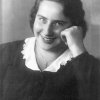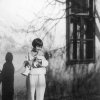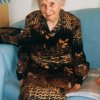Survive Hidden
„For two and a half years I was always imprisoned, also the food supply was difficult, but this was not the worst. The fear, one has always lived under fear. I've often woken up with crap, because I dreamed I heard military boots. You did not know how it would end. To myself, I said I had to kill myself the day they were going to win. I could not hide forever.“ (Wera Heilpern)
In 1923 Wenzel and Maria Jindra from Viehofen took over the eight-month-old Wera as a nursing child. She was the illegitimate child of a Jewish representative who had not found support either with the Jewish - married - child father or with her parents. Wera grew up like the other children of the family, except that she also attended the Jewish religious education as well as the Catholic. In 1933, Wera was suddenly taken away by four physical aunts and had only now secretly contact her family.
After the "Anschluss" Wera was obliged to a Jewish work service to Germany. The inhuman conditions and the ever-threatening deportation drove some of their sufferers into madness. On September 17, 1942, Wera was also requested by the Gestapo to transport to Vienna. When the train stopped in St. Pölten, she jumped out of the car, pulled the yellow star from the dress, and went to Viehofen to say good-bye to her family.
But the family did not let them go away. They hid them in the attic, often during the day in the bed for hours. Only in the dark could she go outside and during the bombings she had to stay in the house. When her foster mother died on September 1, 1944, Wera was picked up the same night by the eldest son Franz and hid until the end of the condolence visits at the attic of his house in Wagram.
„It was a blessing, it would not be so hard to find me. For me, of course, that was terrible, not only that they had probably shot me, no, well, I would have just come, but the consciousness that my nurses and siblings would have had to go with, that would be the biggest burden in my last few minutes.“
After the liberation Wera heard people in St. Pölten say that too few Jews had been killed. She left the city as stateless and went to Vienna, Paris and Strasbourg. On the intervention of her family the St. Pöltner mayor Rudolf Singer and the magistrate Othmar Herzog helped her return. Wera Heilpern died on 17 February 1988 at the age of 66 in Vienna.
Wera Heilperns lifeguards do not want to accept public honors from modesty. At the request of friends, however, there has been a Jindra street in St. Pölten since 2011.
Anna Reiß and her daughter Johanna Glaser also survived as submarines, three years with the Straßmayer family in Nadelbach. Friedrich Wellisch and Oskar Graf were hidden by girlfriends. The State of Israel lends such heroes the title "righteous among the peoples" and places for them a tree in the "Avenue of the Righteous" at the Yad Vashem Memorial in Jerusalem.




